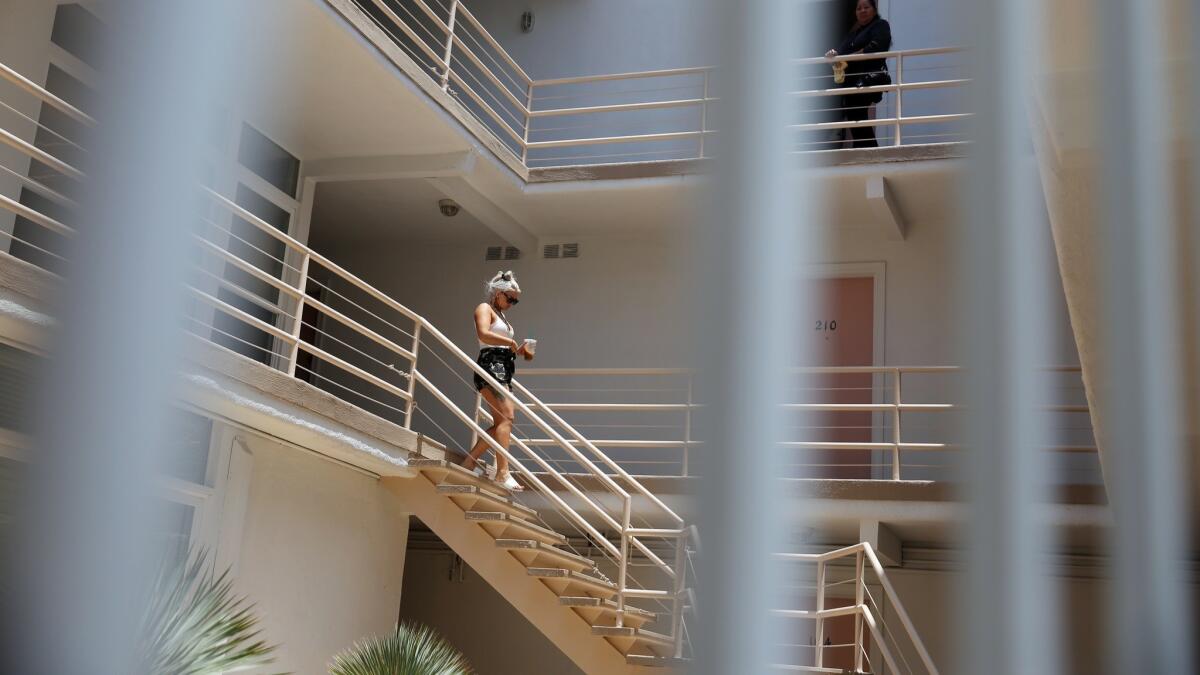L.A. councilman wants to ban short-term leases in rent-controlled buildings

- Share via
A Los Angeles councilman, concerned about the housing crisis, is trying to stop landlords from turning rent-controlled apartments into pricey furnished units for people who want a short-term lease.
Councilman Mike Bonin submitted a motion Friday asking city officials to draft an ordinance requiring initial leases in rent-controlled buildings to last at least 12 months.
This comes after the Los Angeles Times reported on the phenomenon — for example, highlighting a startup that partnered with a Hollywood landlord to turn a $1,800-a-month rent-controlled studio apartment into a $3,300-a-month furnished, extended-stay corporate rental.
Housing advocates say the practice contributes to the affordable housing crisis by taking long-term homes off the market. But corporate housing companies say they provide needed temporary housing at cheaper rates than hotels.
The corporate housing industry says demand is growing for short-term leases of furnished units, leading to a wave of new companies that market apartments to business travelers or people whose primary home is being renovated. Such leases are for at least a month but typically less than a year.
High tenant turnover in rent-controlled units gives landlords more freedom to increase the rents they charge. Although the landlords can set the rent at the beginning of a lease, annual price increases are limited as long as the tenant stays. When that tenant moves out, the landlord can set a new price.
Larry Gross, executive director for the Coalition for Economic Survival, called the situation “another potential threat that could diminish our affordable housing stock and displace tenants,” and he praised Bonin’s response.
“Hopefully it will head off what could be a potentially huge loophole in our current protections around rent-controlled housing,” Gross said.
StayTony founder Tony Diamond, whose company partners with landlords to renovate rent-controlled apartments and offer short-term leases, defended the practice, arguing that it makes staying in Los Angeles accessible to traveling nurses and others. “The important thing is we are very affordable for corporate housing, about as affordable as you will find in the marketplace,” Diamond said.
Overall, Los Angeles County needs nearly 517,000 more units of affordable rental housing to meet demand, and a renter needs to make $47.52 per hour to afford the median monthly rent of $2,471, according to a report by the California Housing Partnership.
Last week, officials reported that L.A. county’s homeless population ballooned 12% in the last year, with a leap of 16% in the city of Los Angeles.
City officials have been trying to regulate short-term rentals popularized by websites such as Airbnb, VRBO and Homeaway. A new law set to take effect July 1 explicitly bans stays of 30 days or less in rent-controlled buildings or in units that aren’t someone’s primary residence — that is, second homes or investment properties.
In his motion Friday, Bonin asked the city to examine whether a similar policy is needed for extended-stay corporate housing.
The motion also asks city officials to create a report on corporate housing units and their effect on Los Angeles’ supply of long-term housing, as well as how other cities have addressed the issue.
The motion was referred to the housing committee, where it will be debated. If approved, it will advance to the City Council for a vote.
City Councilmen Bonin, Marqueece Harris-Dawson, Paul Koretz and David Ryu are also looking into taxing landlords who keep homes vacant, hoping to pressure them into lowering rents and filling up their empty units.
More to Read
Inside the business of entertainment
The Wide Shot brings you news, analysis and insights on everything from streaming wars to production — and what it all means for the future.
You may occasionally receive promotional content from the Los Angeles Times.











